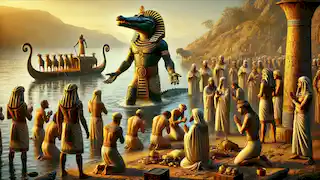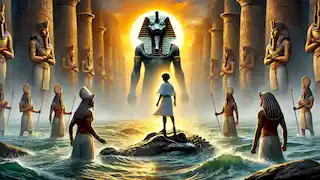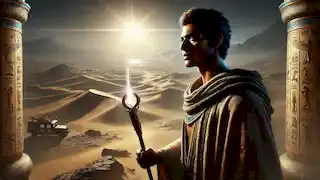The Tale of Sobek
Reading time: 11 min

About this story: The Tale of Sobek is a Myth from Egypt set in the Ancient This Dramatic tale explores themes of Redemption and is suitable for All Ages. It offers Cultural insights. A tale of divine power, sacrifice, and redemption along the Nile.
In the distant land of ancient Egypt, where the sun blazed high and the Nile flowed with life, there existed a god unlike any other. His name was Sobek, the crocodile god, whose power over the waters and fertility of Egypt was both feared and revered. Sobek, often depicted with the head of a crocodile, was a being of great strength, wisdom, and mystery. His story weaves through the legends of gods and mortals, blending the duality of his nature—both destroyer and protector.
Our tale begins long ago, in a time when the gods walked the earth and influenced the fate of mortals. Egypt's lands flourished due to the Nile, and at its heart, Sobek watched over the river's currents, ensuring that life thrived, yet occasionally, reminding the people of his destructive power.
Chapter One: The Nile's Guardian
Sobek, the mighty god of the Nile, lived in the shadowy waters of the great river. His divine form—half man, half crocodile—was a reflection of his role as both protector and punisher. Every year, the Egyptians offered prayers and sacrifices, asking for the Nile's blessings and fearing the anger of Sobek, for the river's flooding could either nourish or destroy the land.
In those times, Sobek was deeply respected, but there were whispers in the wind—rumors that his power was growing beyond control. Some believed that Sobek, with his terrifying presence, desired more than just the worship of the people. They claimed he sought dominion over all the gods, and that his ambitions stretched beyond the Nile itself.
At the height of Sobek's power, the Nile flooded its banks one year more violently than ever before. The waters rose, devouring entire villages, drowning crops, and sending wild beasts onto the shores. The people cried out in despair, unsure if this was punishment or a test. Sobek remained silent, watching from the depths, as the balance between life and destruction hung in the air.
Pharaoh Thutmose III, ruler of the land, sought counsel from the priests. “What must we do to appease the crocodile god?” he asked. “The Nile is our lifeblood, but it has become our greatest threat.”
The High Priest of Sobek, a man named Ramose, knelt before the Pharaoh. “We must go to the source of Sobek’s anger,” he replied solemnly. “Only by offering him a gift worthy of his favor can we hope to calm the waters.”
Thus, a great ceremony was prepared. Offerings of gold, livestock, and the finest fabrics were presented at the temple of Sobek, located in the city of Crocodilopolis. The people gathered, their hearts filled with both fear and hope. As the offerings were cast into the Nile, the waters stilled for a moment, and the great god Sobek emerged from the depths.

His form was magnificent and terrifying. His crocodile head gleamed under the sun, and his human body radiated divine power. The people fell to their knees, hoping their offerings would appease the god.
But Sobek was not interested in gold or livestock. His voice echoed across the land, as deep as the river itself. “Pharaoh,” he boomed, “I do not desire these trinkets. I am the Nile, the bringer of life and death. What I seek is a sacrifice of true value. Only then will the waters recede.”
Chapter Two: The Trials of Pharaoh
Pharaoh Thutmose III, a wise and cunning leader, knew that Sobek's demand would not be satisfied with mere objects. “What must I give, great Sobek?” he asked, his voice steady despite the growing fear in his heart.
Sobek’s eyes glinted with ancient wisdom. “You must offer me the blood of a king, Pharaoh. Only a life of royal blood can calm the wrath of the Nile.”
The crowd gasped in horror. Pharaoh’s life was tied to the prosperity of Egypt, and without him, the land would fall into chaos. Yet, the waters continued to rise, and the people knew that refusal could mean the end of their civilization. Pharaoh Thutmose III stood tall, his face stern but calm. He was not afraid of death, but he knew that his death could lead to a power struggle that would tear Egypt apart.
“I cannot sacrifice myself,” the Pharaoh said slowly, “for the future of Egypt depends on my leadership. But there must be another way. A king’s blood, you say? Does it have to be mine?”
Sobek tilted his head, considering the question. “The blood of a royal will suffice,” he replied. “But beware, Pharaoh. The sacrifice must be willing. If not, the Nile will drown this land until nothing remains.”
The Pharaoh knew what he had to do. He had no children of his own, but there was one royal who might accept the burden: his young nephew, Prince Khamose, a boy of only twelve summers. The Pharaoh called for the boy, his heart heavy with the decision he would soon have to make.
When Prince Khamose arrived, the Pharaoh explained the situation. The boy listened in silence, his eyes wide but resolute. “I will do what must be done for Egypt,” he said bravely. “If my life is the price for the Nile’s peace, then I will give it freely.”
The priests of Sobek prepared for the ritual, and as the day of the sacrifice approached, the people mourned the fate of their young prince. He was beloved by all, known for his kindness and his wisdom beyond his years. Yet, the Nile continued to rise, and they knew there was no other way.
The day of the sacrifice arrived. The sky was dark, and the air was thick with sorrow. Prince Khamose stood by the riverbank, clothed in white, ready to give his life for his people. The priests began their chants, and the waters of the Nile seemed to ripple in anticipation.
Just as the blade was about to fall, Sobek appeared again, rising from the river. “Stop!” his voice boomed across the land. The priests froze, their hands trembling.
“I have seen the boy’s heart,” Sobek said, his tone softer now. “His willingness to sacrifice himself has pleased me. I will not take his life, for such purity should not be extinguished. Instead, I will grant him a gift.”
With a wave of his hand, Sobek blessed Prince Khamose with the power to control the waters. From that day forward, Khamose became a guardian of the Nile, revered alongside Sobek as a protector of the land.

The floodwaters began to recede, and the people rejoiced. Pharaoh Thutmose III knelt before Sobek, offering his thanks. The balance between life and destruction had been restored, but the people of Egypt never forgot the power and mercy of the crocodile god.
Chapter Three: The Rise of Khamose
Under Sobek's blessing, Prince Khamose became a revered figure in Egypt. His ability to control the Nile ensured that the river would flood gently, nourishing the lands without destroying them. The people praised him as a hero, but there was one who envied the young prince’s power.
In the court of Pharaoh, a general named Horemheb had long harbored ambitions of ruling Egypt. Seeing the favor that Khamose had gained, his jealousy festered, and he began plotting to seize power for himself.
Horemheb approached the Pharaoh, his voice filled with false loyalty. “My lord,” he said, bowing low, “while Prince Khamose’s control over the Nile is a blessing, it is also a danger. What if he turns against us? What if he uses his power for his own gain?”
Pharaoh Thutmose III dismissed Horemheb’s concerns. “Khamose has proven his loyalty. He offered his life for Egypt. He is no threat.”
But Horemheb was not easily dissuaded. He whispered his doubts into the ears of the court, slowly turning the nobles against the young prince. The seeds of mistrust were sown, and soon rumors began to spread that Khamose sought to overthrow the Pharaoh and claim the throne for himself.
Khamose, unaware of the treachery around him, continued his work as the guardian of the Nile. He spent his days by the river, ensuring that the waters flowed in harmony with the needs of the people. But as the rumors grew louder, the tension in the court became impossible to ignore.
One day, as Khamose stood by the riverbank, Horemheb approached him, flanked by a group of soldiers. “Prince Khamose,” he said, his voice dripping with malice, “the Pharaoh has ordered your arrest. You are charged with treason against the crown.”
Khamose was taken aback. “Treason?” he asked, his voice filled with confusion. “I have done nothing but serve Egypt and the Nile.”
But Horemheb had anticipated his denial. “The Pharaoh does not believe your lies. You will stand trial, and the truth will be revealed.”
Khamose was brought before the Pharaoh, bound in chains. The court was filled with whispers as Horemheb presented his case. “This boy,” he declared, “has been plotting to overthrow the Pharaoh. His control over the Nile is proof of his desire for power. He seeks to use it to bring Egypt to its knees.”
Pharaoh Thutmose III looked at his nephew with sorrow. “Is this true, Khamose?” he asked.
Khamose shook his head, his heart heavy with the betrayal. “No, my lord. I have done nothing but serve Egypt,
as you commanded. My loyalty has never wavered.”
But the court was swayed by Horemheb’s lies, and the Pharaoh was forced to make a difficult decision. “Khamose,” he said slowly, “I do not believe that you have betrayed us, but the people demand justice. You must be exiled from Egypt, never to return.”
Khamose bowed his head, accepting his fate. He knew that Horemheb’s influence had poisoned the court, but there was nothing he could do to change it. He was taken to the edge of the desert, where the Nile flowed no longer, and left to fend for himself.

Chapter Four: The Return of the Guardian
For years, Khamose wandered the desert, living in solitude. But the bond he shared with the Nile never weakened. He could still feel the pull of the river in his veins, and he knew that one day, he would return to reclaim his place as Egypt’s guardian.
Meanwhile, in Egypt, the absence of Khamose was felt keenly. Without his control over the Nile, the river once again became unpredictable. Floods ravaged the land, and droughts left the people starving. Pharaoh Thutmose III grew old and weak, and Horemheb’s grip on the court tightened.
One day, as Khamose wandered the desert, a vision appeared before him. It was Sobek, his divine benefactor. “Khamose,” Sobek said, “the time has come for you to return to Egypt. The Nile cries out for your guidance, and the people suffer in your absence.”
Khamose nodded, his heart filled with determination. “I will return,” he vowed. “And I will restore balance to the Nile.”
With Sobek’s blessing, Khamose made his way back to Egypt. The journey was long and arduous, but his resolve never wavered. When he finally reached the Nile, he could feel the river’s unrest, as if it too had been waiting for his return.
News of Khamose’s arrival spread quickly, and the people flocked to the riverbank to see their lost prince. Horemheb, now the most powerful man in the court, was furious. “I will not allow this traitor to return,” he snarled. “He must be stopped.”
Horemheb gathered his soldiers and marched to the river, where Khamose stood, his hands outstretched to the waters. “Khamose!” he shouted. “You are not welcome here. Leave now, or face the consequences.”
But Khamose was no longer the boy who had been exiled. He was a man, and his bond with the Nile had only grown stronger. With a single gesture, he commanded the waters to rise, creating a barrier between himself and Horemheb’s forces.
“I do not seek power,” Khamose said calmly. “I seek only to restore balance to the Nile. The river belongs to the people, not to you.”
Horemheb, blinded by his rage, ordered his soldiers to attack, but the waters of the Nile rose higher, swallowing them whole. The people watched in awe as Khamose stood tall, his connection to the river undeniable.
In the end, it was not violence that brought an end to Horemheb’s tyranny. The people, inspired by Khamose’s return, rose up against him, demanding justice for the years of suffering they had endured. Horemheb was deposed, and Khamose was welcomed back as Egypt’s rightful guardian.
{{{_04}}}
Conclusion
Under Khamose’s guidance, the Nile once again became a source of life and prosperity for Egypt. The people flourished, and the land was fertile. Sobek, watching from the depths of the river, was pleased. His blessing had not been in vain, for Khamose had proven himself worthy of the title of Guardian of the Nile.
And so, the tale of Sobek and Khamose became legend, a story told for generations as a reminder of the delicate balance between life and destruction, power and humility, and the enduring bond between the gods and the people of Egypt.


















